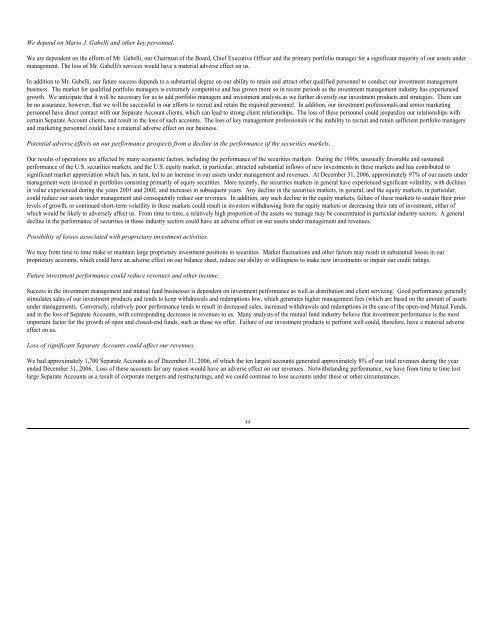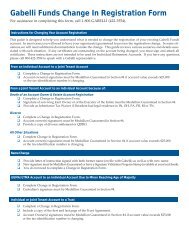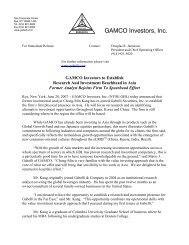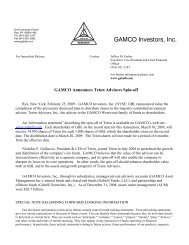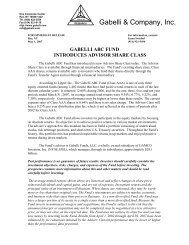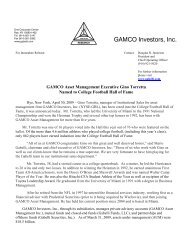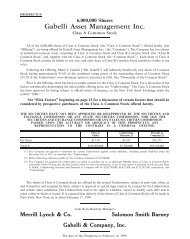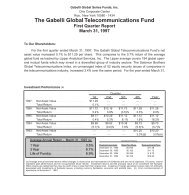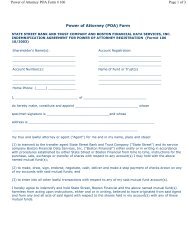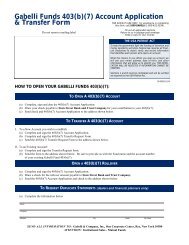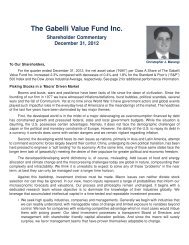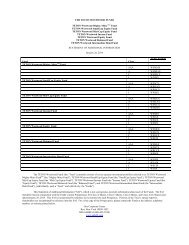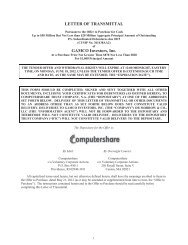FORM 10-K/A GAMCO Investors, Inc. - Gabelli
FORM 10-K/A GAMCO Investors, Inc. - Gabelli
FORM 10-K/A GAMCO Investors, Inc. - Gabelli
- No tags were found...
Create successful ePaper yourself
Turn your PDF publications into a flip-book with our unique Google optimized e-Paper software.
We depend on Mario J. <strong>Gabelli</strong> and other key personnel.<br />
We are dependent on the efforts of Mr. <strong>Gabelli</strong>, our Chairman of the Board, Chief Executive Officer and the primary portfolio manager for a significant majority of our assets under<br />
management. The loss of Mr. <strong>Gabelli</strong>'s services would have a material adverse effect on us.<br />
In addition to Mr. <strong>Gabelli</strong>, our future success depends to a substantial degree on our ability to retain and attract other qualified personnel to conduct our investment management<br />
business. The market for qualified portfolio managers is extremely competitive and has grown more so in recent periods as the investment management industry has experienced<br />
growth. We anticipate that it will be necessary for us to add portfolio managers and investment analysts as we further diversify our investment products and strategies. There can<br />
be no assurance, however, that we will be successful in our efforts to recruit and retain the required personnel. In addition, our investment professionals and senior marketing<br />
personnel have direct contact with our Separate Account clients, which can lead to strong client relationships. The loss of these personnel could jeopardize our relationships with<br />
certain Separate Account clients, and result in the loss of such accounts. The loss of key management professionals or the inability to recruit and retain sufficient portfolio managers<br />
and marketing personnel could have a material adverse effect on our business.<br />
Potential adverse effects on our performance prospects from a decline in the performance of the securities markets.<br />
Our results of operations are affected by many economic factors, including the performance of the securities markets. During the 1990s, unusually favorable and sustained<br />
performance of the U.S. securities markets, and the U.S. equity market, in particular, attracted substantial inflows of new investments in these markets and has contributed to<br />
significant market appreciation which has, in turn, led to an increase in our assets under management and revenues. At December 31, 2006, approximately 97% of our assets under<br />
management were invested in portfolios consisting primarily of equity securities. More recently, the securities markets in general have experienced significant volatility, with declines<br />
in value experienced during the years 2001 and 2002, and increases in subsequent years. Any decline in the securities markets, in general, and the equity markets, in particular,<br />
could reduce our assets under management and consequently reduce our revenues. In addition, any such decline in the equity markets, failure of these markets to sustain their prior<br />
levels of growth, or continued short-term volatility in these markets could result in investors withdrawing from the equity markets or decreasing their rate of investment, either of<br />
which would be likely to adversely affect us. From time to time, a relatively high proportion of the assets we manage may be concentrated in particular industry sectors. A general<br />
decline in the performance of securities in those industry sectors could have an adverse effect on our assets under management and revenues.<br />
Possibility of losses associated with proprietary investment activities.<br />
We may from time to time make or maintain large proprietary investment positions in securities. Market fluctuations and other factors may result in substantial losses in our<br />
proprietary accounts, which could have an adverse effect on our balance sheet, reduce our ability or willingness to make new investments or impair our credit ratings.<br />
Future investment performance could reduce revenues and other income.<br />
Success in the investment management and mutual fund businesses is dependent on investment performance as well as distribution and client servicing. Good performance generally<br />
stimulates sales of our investment products and tends to keep withdrawals and redemptions low, which generates higher management fees (which are based on the amount of assets<br />
under management). Conversely, relatively poor performance tends to result in decreased sales, increased withdrawals and redemptions in the case of the open-end Mutual Funds,<br />
and in the loss of Separate Accounts, with corresponding decreases in revenues to us. Many analysts of the mutual fund industry believe that investment performance is the most<br />
important factor for the growth of open and closed-end funds, such as those we offer. Failure of our investment products to perform well could, therefore, have a material adverse<br />
effect on us.<br />
Loss of significant Separate Accounts could affect our revenues.<br />
We had approximately 1,700 Separate Accounts as of December 31, 2006, of which the ten largest accounts generated approximately 8% of our total revenues during the year<br />
ended December 31, 2006. Loss of these accounts for any reason would have an adverse effect on our revenues. Notwithstanding performance, we have from time to time lost<br />
large Separate Accounts as a result of corporate mergers and restructurings, and we could continue to lose accounts under these or other circumstances.<br />
34


